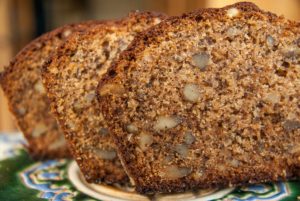*The Health benefits of
Chocolate, Bananas, Blueberries
The Health Benefits Of Bananas
Your average medium banana contains 14 grams of sugar,
A banana’s sugar is entirely natural, Bananas contain, on
average, 3 grams of fiber, which slows the absorption of
sugar into our blood. Some of this fiber comes from pectins,
which further slows the digestion of carbohydrates,
lessening a blood glucose(sugar) spike.
If you’ve been diagnosed with diabetes or have been told
that your blood sugar is a little high, you can still enjoy
bananas. To lessen the sugar spike, pair a banana with
protein and healthy fat such as a nut or seed butter or yogurt.
A banana contains tons of other vitamins and minerals,
fiber and even over 1 gram of protein!

chocolate banana cake
At around 100 calories, a banana contains less than half
a gram of fat. It is true that when excess sugar is digested
and absorbed it can be stored as fat, but if you’re eating
when you’re hungry and not overeating, this will
definitely not happen from eating a 100-calorie banana.
Why bananas get a bad rap in the fruit world, I’m not too
sure. A banana, a medium apple contains around 100
calories and less than 0.5 grams fat.
The apple also contains 19 grams of sugar and less
protein than a banana. And one cup of seedless grapes
provides 23 grams of sugar, with less fiber and less
protein than a banana.

Banana bread
In addition, bananas contain:
17 percent daily value of vitamin C, which is vital for
strong immunity, youthful-looking skin and fighting
oxidative damage. 422 milligrams or 12 percent daily
value of potassium, which is important for heart health,
lowers blood pressure, reduces the risk of stroke and
blocks the absorption of dietary cholesterol. 22 percent
daily value of vitamin B6, which is a vital co-factor in
the production of feel-good hormones serotonin and
norepinephrine.
Here’s the bottom line: Yes, there are fruits that contain
less sugar than a banana (such as berries, citrus fruits
and melon), but bananas are portable, inexpensive
and highly accessible.
https://foodandnutrition.org/blogs/student-scoop/bananas-bad-3-myths-debunked/j
Today, chocolate is lauded for its tremendous
antioxidant potential. The higher the cocoa content,
the more health benefits there are and the less
sugar content, which is better for overall health.
”The recent discovery of biologically active phenolic
compounds in cocoa has stimulated research on its
effects in aging, oxidative stress, blood pressure
regulation, and atherosclerosis.”

The potential benefits of daily chocolate consumption,
may include: Improved liver enzyme levels, preventing
cognitive decline, reduced insulin resistance, reducing
the risk of cardiovascular problems, might help reduce
low-density lipoprotein (LDL) cholesterol levels,
also known as “bad fats.
Dark chocolate has the highest cocoa content, which
means it has the highest levels of antioxidants –
specifically, flavonoids – which are molecules that
can prevent some forms of cell damage.
Those who eat chocolate every day were found to
have reduced insulin resistance and The effect was
stronger the higher the chocolate consumption, the
team reports.
 Drinking tea and coffee, rich
Drinking tea and coffee, rich
in the antioxidants polyphenols,
have the potential to spur
chocolate’s benefits for reduced
risk of developing diabetes,
heart disease, or stroke.
Expectant mothers:
eating 30 grams of chocolate every day during
pregnancy might benefit fetal growth and development.
** Studies suggest moderate chocolate
consumption at least once weekly.
There are health benefits to chocolate,
and, there are negative aspects to chocolate.
As ever, moderation is the key.
Overconsumption can lead to health problems,
such as tooth decay and obesity.
*Findings in the British Journal of Nutrition
from a study by Warwick Medical School, United
Kingdom Luxembourg Institute of Health
Health Benefits of Blueberries

Blueberries Contain folate, vitamin A, calcium, phosphorus,
magnesium, beta-carotene, vitamin E, and manganese! They’re
also known for being rich with antioxidants – blueberries contain a
flavonoid called anthocyanin, which give blueberries many of their
health benefits as well as their signature color. Because blueberries
freeze so well, it’s easy to enjoy this fantastic fruit year-round.
1. Muscle recovery blueberries can increase the rate of muscle
strength recovery and muscle repair.
2. Blueberries can reduce inflammation and protect against the
artery hardening that raises the risk of heart attack and strokes.
3. Fighting urinary tract infections, Blueberries have the same
anti-adhesives anti-adhesives in cranberry juice that prevent
bacteria from infecting the bladder.
4. Damaged DNA also contributes to the growth of cancer, The
high levels of antioxidants in blueberries neutralize some of
the free radicals that can damage DNA.
5. Blueberries contain several minerals and vitamins that contribute to
bone health, like iron, phosphorous, calcium, zinc, and vitamin K.which
improves calcium absorption Low vitamin K levels have been linked
risk of bone fracture, as vitamin K intake .
6. These phytochemicals help blood flow and the regulation of blood
pressure Research indicates blueberries may prevent hypertension.
7. Research suggests Blueberries can improve can help lower
blood sugar levels, and insulin sensitivity, which lowers the risk
of type 2 diabetes, heart disease, and stroke. .
8. Blueberries help with Weight loss and healthy digestion as
well. The relatively high fiber content of blueberries can help prevent
constipation and maintain a regular digestive system. Adequate fiber
in your diet can help you achieve a full feeling, helping reduce overall
caloric intake, and assist in weight-loss efforts.
9. Skin damage prevention Collagen, which relies on vitamin C to function
correctly, is what makes the skin elastic and prevents skin damage from
the sun’s UV rays and environmental pollution. One serving of blueberries
contains nearly a quarter of the recommended daily value of vitamin C.
10. Improved brain function. A 2019 study investigated the relationship
between blueberry consumption and cognitive abilities. It found blueberries
can “improve delayed memory and cognitive function in children, healthy older
adults, and adults with some cognitive impairment.Blueberries also improve
short-term memory.
The nutritional rundown
A serving size of blueberries is one cup, which is 148 grams, or
anywhere from 65 to 75 berries. According to the USDA, based
on a 2,000-calorie diet, one serving of blueberries contains:
Calories: 84.4
Protein: 1.1 grams (2% recommended dietary intake [RDI])
Carbohydrates: 21.4 grams (7% RDI) Sugar: 14.7 grams
Potassium: 114 milligrams (3% RDI) Fiber: 3.6 grams (14% RDI)
Vitamin C: 14.4 milligrams (24% RDI) Vitamin B6: 0.77 milligrams (5% RDI)
++++++++++++++++++++++++++++++++++++++





